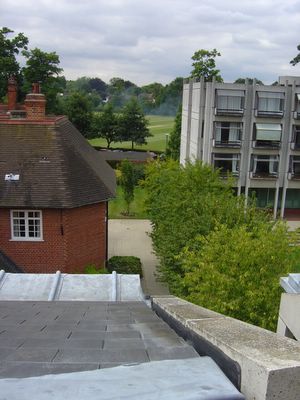Talking Danish Westerns with Lyn: "Dear Wendy"Doug: Heya
Lyn.
Lyn: Hi Doug. Um, don’t you feel uncomfortable appropriating my voice like this?
Doug: Not especially.
Lyn: Just checking.
Doug: I mean, especially since you’ve done it to me in the past …
Lyn: I said, ‘just checking’, OK?
Doug: and since you’re not updating
Lynscreens at present …
Lyn: Yeah, a change of subject anytime now would be fine.
Doug: And especially since we’re going to be talking about movies.
Lyn: So, what’ve you been seeing?
Doug: Ooh, astounding conversational flanking manoeuvre there.
Lyn: But you’ll fall for it, won’t you? C’mon, recent viewing. I want opinions, dammit!
Doug: Right, well I’ve seen “Charlie and the Chocolate Factory”. I take it back, Depp does outdo Wilder; I like the new material, and the tone is much more suitably dark for Dahl. I went to see “Fantastic Four” – trash, but good, amiable clean-cut trash. And I, despite myself, loved “Wedding Crashers”: I did not expect to be laughing at cringe comedy for two solid hours.
Lyn: You never bother saying anything that concisely. So, what’re you saving the words for?
Doug: “
Dear Wendy.” Man, that is an amazing, but really pretty damn disturbing film.
Lyn: I’ve heard it called a Danish Western. The script’s by Lars von Trier, right?
Doug: Yeah, but it’s not really a Western. And it’s not terribly Danish – other than the director, crew, funding and the locations. It’s an American small-town tragedy, and it’s about how the fear of violence gives rise to violence.
Lyn: Gimme a narrative hook here.
Doug: Jamie “Billy Elliot” Bell is a loner/loser in a small mining town until he stumbles across an old gun, which despite his pacifist convictions he can’t throw away. Forging bonds with other outcasts, he soon has a small club of “armed pacifists”, who carry their “partners” for “moral support”. They develop their own code of “Dandyism” (with nods to Oscar Wilde and Brideshead Revisited), grow as people and swear never to use their guns to kill. In fact, they don’t even use the word “killing”, they refer to it as “loving”.
Lyn: That, right there, does not sound especially healthy.
Doug: Hell, wait ‘til you hear how their private language interacts with the retro-cool Zombies soundtrack.
All the action takes place in a tiny town square, or one of two mines nearby. Yet without the Fight-Club-esque device of framing of much of the movie as an extended flashback, making it perfectly clear things are going to go badly wrong, the little fragment of a town would really not have any oppressive sense of claustrophobia.
People talk about their fear of gangs with guns, and about being beaten up at school. But we never see these things. Their square is a strangely innocent oasis. The characters also have some of the misfit innocence of Depp in “Edward Scissorhands”, which I saw last night on a big screen, too.
Lyn: Stick to the point here. So, it has an innocence. I think you’re circling the word “Romanticism”.
Doug: Yes, it definitely explores Romanticism, and its obsession with death and mortality and also the connection between fear and violence. A town that imagines gangs of armed youths summons one into being. Also, for all their preternatural skill with their weapons, it is painfully apparent that this is not a Western where the heroes will be able to take on vastly superior numbers of black-hats and win.
Dandyist armed pacifism has been seen as a satire of Western foreign policy, but I think it’s a far more disturbing exploration of the empty heroism of symbolic acts.
Lyn: You use the word “exploring” a lot. You don’t think von Trier’s moralising, then?
Doug: No. This is a tragedy, in the true sense of not being about unhappiness, but in the remorseless working out of events.
Lyn: So, is it realistic, then?
Doug: No, but it’s compelling. It is has a sense of heightened unreality, a deliberateness that gives the characters depth despite occasionally too-smooth dialogue. It’s a great film. Disturbing, yes. But well worth seeing.



